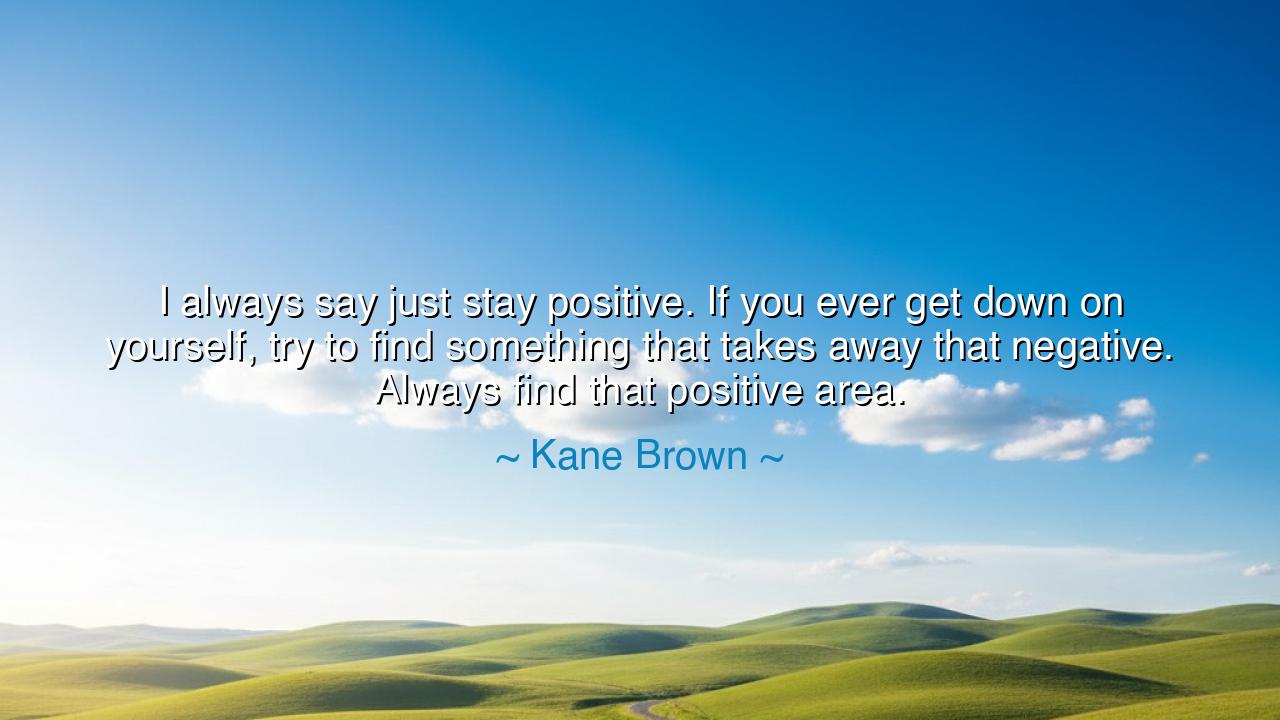
I always say just stay positive. If you ever get down on
I always say just stay positive. If you ever get down on yourself, try to find something that takes away that negative. Always find that positive area.






The words of Kane Brown—“I always say just stay positive. If you ever get down on yourself, try to find something that takes away that negative. Always find that positive area.”—resound with the steady voice of one who has wrestled with hardship and chosen light over darkness. They are not the shallow counsel of one who has never suffered, but the encouragement of one who knows that life will press upon the heart, and that despair must be met with courage. His words reveal a simple yet profound truth: the human spirit thrives when it learns to shift its gaze from the weight of the negative toward the strength of the positive.
The ancients, too, spoke of this balance. The Stoics taught that while suffering is inevitable, it is our response that defines us. Epictetus declared that though we cannot control the blows of fate, we can control the way we interpret them. Brown’s counsel to “find that positive area” is nothing less than this timeless philosophy dressed in modern words: when crushed by darkness, seek even the smallest flame, and let it guide you forward. For no heart can endure long if it drinks only bitterness.
History gives us radiant examples of this truth. Consider Nelson Mandela, who endured twenty-seven years in prison. He could have surrendered to resentment and despair, yet he chose to fix his gaze on reconciliation and justice. That choice of positivity, even in the face of crushing negatives, not only preserved his soul but altered the destiny of a nation. His life teaches what Brown affirms: that the secret of endurance lies not in denying hardship, but in choosing where to focus the mind.
Brown’s wisdom also speaks to the common struggle of self-doubt. “If you ever get down on yourself…” he says, acknowledging the universal truth that every soul falters, that each of us carries moments of failure, weakness, or shame. Yet he does not advise ignoring such moments; instead, he points us toward transformation. Replace the weight of self-condemnation with something uplifting—music, gratitude, friendship, prayer, or purpose. This act of turning from negative to positive is both an art and a discipline, and it is within the reach of all.
There is a heroic humility in his words. He does not promise that positivity erases pain, nor that life will become easy. Rather, he calls us to practice resilience, to build within ourselves a wellspring that can be drawn upon when the world becomes harsh. To “always find that positive area” is not to live in denial, but to live in defiance—to refuse to let sorrow have the last word. It is to say: though the storm rages, there is still shelter; though the night falls, the dawn is certain.
The lesson for us is eternal: cultivate the habit of seeking the good in every circumstance. Train your heart to notice blessings, however small. Practice gratitude daily. When failure comes, search for the lesson within it. When sorrow strikes, hold fast to the hope that healing will follow. By this discipline, the soul becomes resilient, able to withstand not only small trials but great ones, and to rise again even after being cast down.
So, dear listener, let Kane Brown’s words be written upon your heart. Stay positive, even when the weight of life seems unbearable. Do not linger in the shadows of self-doubt, but turn your eyes to what uplifts and strengthens you. Always, always search for that “positive area”—for it is there, waiting to be found. And in finding it, you will not only endure but shine, becoming a beacon for others who walk their own paths through darkness.






NVTrung Nguyen Van
This quote makes me think about resilience and coping mechanisms. Can focusing on positive areas reduce the mental impact of setbacks or criticism? I also question whether there is a balance to strike between positivity and facing reality—how do you ensure that looking for positives doesn’t become avoidance? Exploring how mindset shifts can influence problem-solving, stress management, and emotional health seems essential to understanding the broader impact of this advice.
NDTa Ngoc Diem
I’m intrigued by the idea of counteracting negativity by actively finding positives. Does this approach work better in certain situations, such as stress or creative work, compared to deep emotional trauma? I also wonder how one trains the mind to identify uplifting elements reliably. Could daily routines, journaling, or gratitude practices enhance the ability to consistently find these positive areas, and what impact might this have on overall well-being?
NHNgan Ha
This statement prompts thoughts about motivation and habit formation. How does the practice of consistently seeking positive aspects influence long-term behavior and outlook? Are there risks of overlooking important issues if one focuses too heavily on positivity? I also wonder how this principle applies in team environments or leadership—can encouraging a focus on positives improve collaboration, morale, and productivity, or does it need to be tempered with realism?
HDHiep Dinh
Reading this quote makes me reflect on the role of mindset in coping with challenges. Does focusing on positive aspects actually improve outcomes, or is it more about emotional regulation? I also wonder how culture, personality, or upbringing influence one’s ability to maintain this approach. Could teaching techniques for finding positive areas become part of mental health education or personal development programs to help people manage stress more effectively?
TTTung Tieu
I find this perspective encouraging, yet it raises questions about emotional processing. Is staying positive about reframing every negative moment, or can it coexist with acknowledging difficult feelings? I also wonder if constantly seeking positives could inadvertently create pressure to suppress genuine emotions. How do individuals balance maintaining optimism with authentic self-reflection, and can this approach help in both personal and professional contexts?